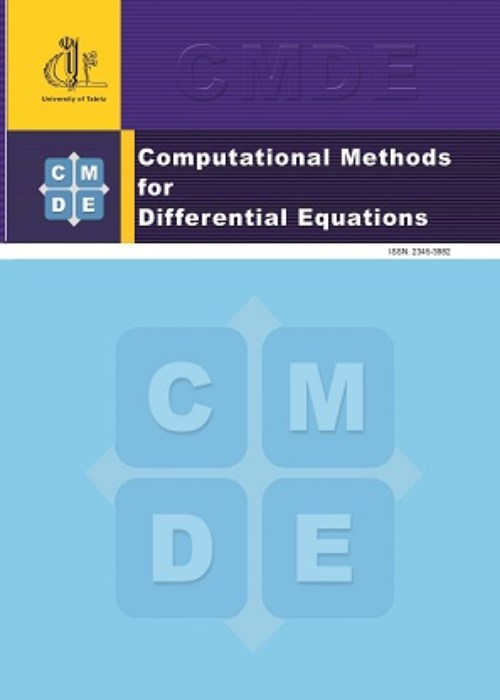فهرست مطالب
Computational Methods for Differential Equations
Volume:3 Issue: 3, Summer 2015
- تاریخ انتشار: 1394/04/10
- تعداد عناوین: 6
-
-
Pages 147-162
In this paper, a collocation method for solving high-order linear partial differential equations (PDEs) with variable coefficients under more general form of conditions is presented. This method is based on the approximation of the truncated double exponential second kind Chebyshev (ESC) series. The definition of the partial derivative is presented and derived as new operational matrices of derivatives. All principles and properties of the ESC functions are derived and introduced by us as a new basis defined in the whole range. The method transforms the PDEs and conditions into block matrix equations, which correspond to system of linear algebraic equations with unknown ESC coefficients, by using ESC collocation points. Combining these matrix equations and then solving the system yield the ESC coefficients of the solution function. Numerical examples are included to test the validity and applicability of the method.
Keywords: Exponential second kind Chebyshev functions, High-order partial differential equations, Collocation method -
Pages 163-176In this article, we investigate sufficient conditions for existence of maximal and minimal solutions to a coupled system of highly nonlinear differential equations of fractional order with mixed type boundary conditions. To achieve this goal, we apply monotone iterative technique together with the method of upper and lower solutions. Also an error estimation is given to check the accuracy of the method. We provide an example to illustrate our main results.Keywords: Coupled system, Mixed type boundary conditions, Upper, lower solutions, Monotone iterative technique, Existence, uniqueness results
-
Pages 177-191In this paper, a new numerical method is presented for solving the optimal control problems of Bang-Bang type with free or fixed terminal time. The method is based on Bezier polynomials which are presented in any interval as $[t_0,t_f]$. The problems are reduced to a constrained problems which can be solved by using Lagrangian method. The constraints of these problems are terminal state and conditions. Illustrative examples are included to demonstrate the validity and applicability of the method.Keywords: Optimal control, Bang-Bang control, Minimum-time, Bezier polynomials family, Best approximation
-
Pages 192-199Based on symbolic manipulation program Maple and using Riccati equation mapping method several explicit exact solutions including kink, soliton-like, periodic and rational solutions are obtained for (2+1)-dimensional variable coefficient Broer-Kaup system in quite a straightforward manner. The known solutions of Riccati equation are used to construct new solutions for variable coefficient Broer-Kaup system.Keywords: Broer-Kaup equations, Riccati equation mapping method, Explicit exact solutions
-
Pages 200-217In this paper, we present a capable algorithm for solving a class of nonlinear optimal control problems (OCP's). The approach rest mainly on the differential transform method (DTM) which is one of the approximate methods. The DTM is a powerful and efficient technique for finding solutions of nonlinear equations without the need of a linearization process. Utilizing this approach, the optimal control and the corresponding trajectory of the OCP's are found in the form of rapidly convergent series with easily computed components. Numerical results are also given for several test examples to demonstrate the applicability and the efficiency of the method.Keywords: Optimal Control Problems, Differential transform method, Hamiltonian system
-
Pages 218-230
In this paper, non-polynomial spline method for solving Coupled Burgers Equations are presented. We take a new spline function. The stability analysis using Von-Neumann technique shows the scheme is unconditionally stable. To test accuracy the error norms 2L, L are computed and give two examples to illustrate the sufficiency of the method for solving such nonlinear partial differential equations. These results show that the technique introduced here is accurate and easy to apply.
Keywords: Non-polynomial, spline method, Coupled, Burger’s, Equations


